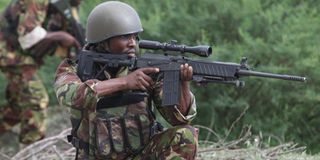Britain backs Kenya on KDF exit from Somalia

Kenya Defence Forces soldiers, under the Africa Union Mission in Somalia (Amisom), take an aim during patrol in Afmadow on November 22, 2015.
What you need to know:
- President Uhuru Kenyatta has constantly steered away from the topic of when KDF will exit Somalia, saying it depends on the country’s stability.
- The unit based in Nanyuki had been recalled to the UK earlier in March following the Covid-19 outbreak.
Britain has backed Kenya’s cautious stance on withdrawal of Kenya Defence Forces troops from Somalia, saying exit will be dependent on the country’s stability.
This comes as the UK and Kenyan soldiers started joint training under a newly established military partnership agreed upon earlier this year.
Deputy British High Commissioner Julius Court said Britain is closely monitoring the situation in Somalia.
Like Kenya, Britain has remained coy over the timelines of withdrawal of foreign troops from Somalia with the 2021 deadline fast approaching.
“The UK continues to monitor the situation in Somalia. Our concern is for the country to achieve stability,” Mr Court said at the KDF School of Infantry (SOI) in Isiolo.
The envoy, alongside British and KDF army officials, on Wednesday witnessed joint military exercises at Archer’s Post and SOI training facilities in Samburu and Isiolo counties.
600 KDF personnel
More than 600 KDF personnel are taking part in the training ahead of deployment to the Africa Union Mission in Somalia (Amisom).
Kenya and other countries contributing soldiers to Amisom are expected to leave Somalia by December 2021. This is based on the UN Security Council Resolution 2472 of May 31, 2019.
In the meantime, the timelines of Kenya’s withdrawal remain unknown, with the next contingent of troops expected to deploy in January.
President Uhuru Kenyatta has constantly steered away from the topic of when KDF will exit Somalia, saying it depends on the country’s stability.
KDF officials have lauded the joint training, saying the newly acquired skill-sets will be a game-changer in the war against terror. “Of course this is a game-changer and an opportunity to improve on the gaps we have identified in the past during our mission. This will improve our military capabilities and also reduce the number of casualties,” KDF School of Infantry Commandant Brigadier Joakim Mwamburi said.
The training is provided by UK and KDF instructors.
At the same time, Britain will redeploy its troops back into Kenya in January to continue with its training programme under the British Army Training Unit in Kenya (Batuk).
The unit based in Nanyuki had been recalled to the UK earlier in March following the Covid-19 outbreak. “Some of the staffers are already back...we are ready to resume training with our Kenya Defence Forces partners,” Mr Court said on Wednesday.
According to Brigadier Mark Thornhill, Defence adviser to the British High Commission, Batuk training in Nanyuki will officially resume in January when the troops are expected to jet into the country.




